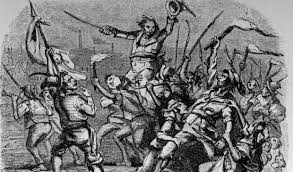Speaking of certain debates that surround the Jesus figure I found the following passage by a historian of Luddism quite interesting:

One reason for [the impact that Luddism made at the time] was the ubiquity of the name. Previous labor struggles had failed to give rise to a name or an emblem that stuck. Those involved had rarely given themselves a title and were generically labeled by the authorities simply as ‘‘depradators,’’ ‘‘the disaffected,’’ or, more frequently, ‘‘the mob.’’ Yet the machine breakers of 1811–12 were referred to almost from the start as ‘‘Luddites,’’ the name they gave themselves. This self-depiction as the followers of ‘‘Ned Ludd,’’ who was soon promoted to ‘‘General,’’ merits some consideration. After all, the perhaps apocryphal Ned was, at first sight, hardly a heroic figure. An apprentice stocking-frame knitter, he had, the story ran, been criticized for making his hose too loose. He was therefore instructed to ‘‘square his needles,’’ namely to adjust the mechanism of his frame. Ned allegedly took this instruction literally and, with a hammer, flattened the entire workings. Frame breaking certainly characterized the East Midland disturbances in 1811, but the targets were only the ‘‘wide’’ frames that produced ‘‘deceitfully wrought’’ hose, not frames in general. Naming oneself after such a figure at the least indicates a sense of irony and self-deprecation that is remarkable, perhaps reflecting the way in which Burke’s scornful ascription of the common people as ‘‘the swinish multitude’’ was turned into a badge of honor by plebeian radicals in the 1790s. Certainly, in no time Ned acquired a fame that set him above a far more famous local hero:
Chant no more your old rhymes about bold Robin Hood,
His feats I but little admire
I will sing the Atchievements of General Ludd
Now the Hero of Nottinghamshire.*
Robin had famously robbed the rich to give to the poor and defended the weak against arbitrary baronial power. But Ned Ludd epitomized the right of the poor to earn their own livelihood and to defend the customs of their trade against dishonorable capitalist depredators. While Robin, a displaced gentleman, signified paternal protection, Ned Ludd evidenced the sturdy self-reliance of a community prepared to resist for itself the notion that market forces rather than moral values should shape the fate of labor. Ned Ludd was not only a symbol of plebeian resistance; he was an ideological figure as well, one who reflected the deep sense of history that underpinned the customary values of working communities in the manufacturing districts.
* ‘‘General Ludd’s Triumph,’’ sung to the tune ‘‘Poor Jack’’: HO 42/119. This song summarized the aim of the East Midland Luddites, and indeed the aspiration of many other trades, namely that ‘‘full-fashioned work at the old fashioned price’’ should be ‘‘established by Custom and Law.’’ The capitalization of Custom and Law was original and deliberate, signifying the importance of both to artisans everywhere.
(Binfield, xiii-xiv)
Binfield, Kevin. Writings of the Luddites. Johns Hopkins University Press, 2015. — h/t Droge, Arthur J. “Jesus and Ned Ludd: What’s in a Name?” Caesar: A Journal for the Critical Study of Religion and Human Values 3 (2009): 5.
Neil Godfrey
Latest posts by Neil Godfrey (see all)
- Comparing Samaria and Judah/Yehud – and their religion – in Persian Times - 2024-04-20 07:15:59 GMT+0000
- Samaria in the Persian Period - 2024-04-15 11:49:57 GMT+0000
- No Evidence Jerusalem/Judea had a “Writing Culture” in Persian times — Israel Finkelstein - 2024-04-12 09:45:34 GMT+0000
If you enjoyed this post, please consider donating to Vridar. Thanks!

Now, if only someone would research the historical Uncle Sam
I dunno, how could a failed painter with a mediocre war record found the 3rd Reich?